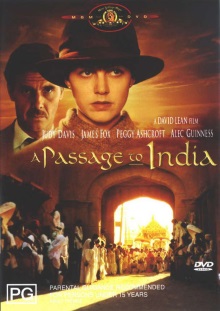
A Passage to India was David Lean’s final film and he made it only after a pause of some 14 years. I’d previously written about Brief Encounter as being one of the best romantic films I’d ever watched and before that we were very glad to have spent the nearly four hours required for Lawrence of Arabia. It stands to reason that we were expecting similar greatness out of this film.
It’s the 1920s and a young woman Adela Quested travels with an older one Mrs Moore from England to India in order to visit the latter’s son Ronny Heaslop. He’s the magistrate of the town of Chandrapore and Miss Quested’s fiancé. They also befriend Richard Fielding, the school superintendent of the town, and Aziz Ahmad, an Indian doctor. The newcomers are shown the local sights but they are disappointed when it turns out to be mostly examples of British culture transplanted to India and yearn instead to see the real India. As such Aziz Ahmad invites the two to visit the famous Marabar Caves.
With David Lean at the helm and a title like this, one would expect plenty of sweeping vistas of India, seen through the exotic lens of the British. You wouldn’t be wrong either, except that there are fewer such shots than I’d have liked. Some of the best of these shots only appear at the very end in the epilogue set in Kashmir. In fact, the entire film feels surprisingly restrained and modest instead of being a soaring epic that can match up to Lawrence of Arabia. This is disappointing enough but is only doubly so as this strange hesitance applies as well to the film’s themes.
As one can see right from the early scene in which the British arrivals in their car dangerously blow past Aziz and his friend on bicycles, that theme is obviously a critique of the British Raj. Most of it is blatant stuff that we’ve all seen before, such as the head of the British administration muttering darkly about how nothing good ever comes out of the British and the Indians mixing socially. Fortunately there are also subtler examples of British privilege that I liked. For example, both Mrs Moore and Miss Quested obviously consider themselves to be above the casual racism and arrogance of their fellow British, yet both are unaware of the massive effort and cost that a trip for them to the caves would entail and what a huge sacrifice it represents for Aziz.
Unfortunately this thread never really goes anywhere and the film essentially goes off in a different direction in the second half as a courtroom drama. The shift in gears felt stilted and unsatisfying to me, especially since Miss Quested was a major point of view character before this but the film hides her away at this point until the end in order to preserve a sense of mystery about what really happened at the caves. I also felt uncomfortable with this plotline and I’m pretty sure a story about an excitable woman making a false rape accusation will be received very poorly if it were released today and rightly so. Throughout all this, the character of Professor Godbole acts like some sort of stereotypical mystic, hinting at the caves having some dark power and being able to predict to some extent the bad events that are occurring. Even worse, he’s played by Alec Guinness instead of an Indian actor. For a film that wants to be high-minded about these issues, all this feels remarkably racist.
I’m aware that this is based on a highly regarded novel and perhaps it really is better handled in the book itself. But I find that while this film is still enjoyable enough to watch, it didn’t really work for me on multiple levels and I mostly found it to be a massive disappointment. I’d love to watch a good film about the British Raj but this just isn’t it.